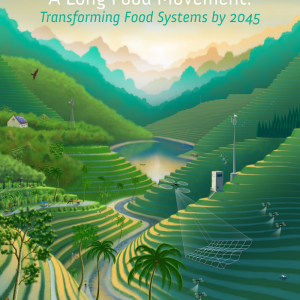
This report from IPES-Food and ETC Group maps two diverging visions for the future of food systems: business-as-usual with high dependence on data platforms, private equity firms and AI-controlled farming systems, versus the “Long Food Movement” - a food system transformation led by civil society and social movements where the emphasis is on food sovereignty and agroecology.
Within the “Long Food Movement” scenario - which the report argues in favour of - four pathways for food systems reform and transformation are examined:
- Rooting food systems in diversity, agroecology, and human rights.
- Transforming governance structures, for example by using food policy councils, deliberative dialogues, and other mechanisms to strengthen the participation of social movements, Indigenous peoples, and NGOs.
- Shifting financial flows such as research budgets, commodity subsidies and food and corporation taxes.
- Rethinking the modalities of civil society collaboration, for example by normalising cross-sectoral collaboration, monitoring corporate commodity chains, and financing food system transformation through new partnerships between donors and food movements.
Read the full report, A Long Food Movement: Transforming Food Systems by 2045, here or here (PDF link). See also the Table explainer What is sustainable intensification?







Post a new comment »